If you don’t want to indulge my storytelling and preaching a bit, jump down to the actual book descriptions, although I hope you enjoy my first few paragraphs explaining why we are so eager to tell about these books on creation care. You can order any by clicking on the “order” link at the very bottom of the post. If you don’t hear back from us within a day, by all means, try again, or call. We always reply to confirm that we got your order or inquiry. Of course, we have lots more books than these here mentioned in BookNotes. Let us know if we can help further. Thanks for your support. We are grateful.
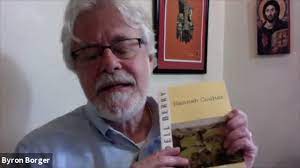 A few weeks ago I was asked to do a Zoom presentation, a talk on the Biblical basis for creation care (what some call environmental stewardship) and cultivating a faith-based ecological worldview. I noted that we’ve written often (here at BookNotes) about the good books available that remind us to “tend and keep the garden” as Genesis 2 puts it. It was an honor to speak to a small group from an evangelical church in a major East Coast city, one troubled by pollution of all sorts. What a beautiful thing to see young professionals praying for God’s guidance as they desired to learn more about how to be faithful in this aspect of our complicated days. I’m no expert but they mostly needed some guidance in opening up the Biblical texts and seeing a coherent eco-theology that emerges from God’s Word. It was a great joy that I did not take lightly.
A few weeks ago I was asked to do a Zoom presentation, a talk on the Biblical basis for creation care (what some call environmental stewardship) and cultivating a faith-based ecological worldview. I noted that we’ve written often (here at BookNotes) about the good books available that remind us to “tend and keep the garden” as Genesis 2 puts it. It was an honor to speak to a small group from an evangelical church in a major East Coast city, one troubled by pollution of all sorts. What a beautiful thing to see young professionals praying for God’s guidance as they desired to learn more about how to be faithful in this aspect of our complicated days. I’m no expert but they mostly needed some guidance in opening up the Biblical texts and seeing a coherent eco-theology that emerges from God’s Word. It was a great joy that I did not take lightly.
In small ways I’ve shared these sorts of teachings in various venues over the years — from picking up litter with a local EUB church youth fellowship group on that first Earth day (1970) to helping college students understand the Lordship of Christ over His good creation when 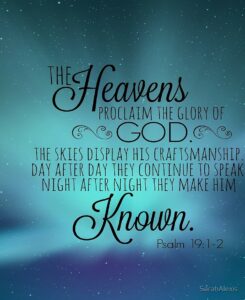 not too many were writing about this, to training folks in nonviolent civil disobedience against TMI-era nuke plants, to testifying about the loss of wonder (and the capacity for proper awe of God, according to some Old Testament texts) when we experience creational degradation such as light pollution. My little testimony about Psalm 19:1-4 in a public hearing fighting a local Wal Mart expansion into country fields was shown on Cable TV on and off for years.
not too many were writing about this, to training folks in nonviolent civil disobedience against TMI-era nuke plants, to testifying about the loss of wonder (and the capacity for proper awe of God, according to some Old Testament texts) when we experience creational degradation such as light pollution. My little testimony about Psalm 19:1-4 in a public hearing fighting a local Wal Mart expansion into country fields was shown on Cable TV on and off for years.
Beth and I are not very good at all this these days and we certainly aren’t legalistic. We do know that recycling each week can be — at least according to Romans 12:2 or I Corinthians 10:31— an act of worship. I take courage that at least one of the answers to the every-present question of “Where is God when there is so much pain in the world?” — at least according to the last half of Job — is that God has taken great delight in His power shown in creation and given it to us as a gift, to His own glory. Listen to the animals (even the birds and the fish and the land) and they will teach you, Job 12: 7-8 says. Attentiveness to creation is without a doubt a core component of any faithfully Biblical spiritual formation. We are not gnostic mystics or lost in our own clouds of unknowing or waiting for a rapture so we can go to heaven , but sons of Adam and daughters of Eve, Earthlings in the image of a Creator-God, tasked with the holy vocation of caring well for our creation home, God’s temple.
I’ve often paraphrased a quip by Tony Campolo from when he was preaching through a passage about the groaning of the hurting creation itself (Romans 8:19-23) and how he noted that much of that chapter is about the Holy Spirit. “If you want to be charismatic and really empowered by the Spirit,” Tony playfully chided, “you have to go green.” I remember he said that he sometimes asks those claiming to be in touch with the Holy Spirit if they recycle, to see if they really were. Ha. I told that Zoom group with a chuckle that I think he is pretty much right. Ecological virtues and creation-care practices are part of our whole-life discipleship and a faithful, holy lifestyle here on God’s beloved planet.
Diving into the amazingly plentiful Biblical texts that shape our creational imagination and inspire us to holy earth-keeping, we spent time talking about the Bible and their city, about the groaning creation here and now and embodying Kingdom hope. We were inspired by the glorious goodness of God’s cosmos and reminded ourselves how Jesus Himself seemed so attuned to nature (consider the lilies and all) and (at least according to Mark 16:15) commanded His followers to proclaim the gospel “to the whole creation.” The Bible tells us over and over that God takes delight in his good creation; that is certainly one reason to mourn species extinction: when even a rare or obscure species disappears it is one less voice in the choir of praise that our awesome God deserves. Who wants to be responsible for stealing from God the weight of glory to be ascribed to Him? I cited the beloved Revelation 4:11 — beloved at least among those who worship well — and noted that God is worthy “to receive glory and honor and power.” Some of us even raise our hands in praise when worship leaders lead us in singing that line. But why? Look it up for yourself and see the rest of the verse: God’s own worthy glory is because God “created all things and by your will they were created and have their being.”
Of course this in no way makes us pantheists. We don’t worship creation even if we love how God is so very imminent, holding up all things (as Colossians 1: 15-20 so powerful sings.) I quoted Francis Schaeffer’s Pollution and the Death of Man on that score (and noted that no Christian creation care advocate I know teaches such a heresy, so when critics charge that, they are pretty much just wasting breath against a straw man.) We don’t fight pollution and work against the changing climate only because of the stewardship mandate of Genesis 1 and 2 (although that foundational command sure ought to be enough) or just because God’s glory is reflected in the world He created. We frame our feeble ecological efforts by the theology of redemption. We know that God is in the very business of restoring all things; Jesus — God in Earthly flesh — is incarnated into this very world of physicality and matter, promising that the groaning creation itself will be redeemed, renewed, restored — “all things” as Ephesians 1:10 puts it.
It is worth recalling that the famous “Behold I make all things new” from Revelation 21:5 uses a word in Greek that does not mean “brand new.” Some Greek scholars debate this and your study Bible might have a note about it, but I can be said that God is not trashing the trashed 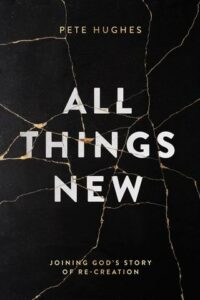 creation and starting over with a brand new one (let alone taking us to an ethereal heaven.) God is remaking all things, making all things (re)new(ed.) As Pete Hughes puts it in All Things New: Joining God’s Story of Re-creation, the very story of the Bible follows a pattern of creation > de-creation > re-creation. The Kingdom comes “on Earth as it is in Heaven.” It is that for which we are to hunger and thirst according to Jesus’s beatitudes and in Him the meek will inherit that healed Earth.
creation and starting over with a brand new one (let alone taking us to an ethereal heaven.) God is remaking all things, making all things (re)new(ed.) As Pete Hughes puts it in All Things New: Joining God’s Story of Re-creation, the very story of the Bible follows a pattern of creation > de-creation > re-creation. The Kingdom comes “on Earth as it is in Heaven.” It is that for which we are to hunger and thirst according to Jesus’s beatitudes and in Him the meek will inherit that healed Earth.
That sort of longing, to be a part of the Biblical drama of a good creation that is deeply ruined but being graciously rescued and renewed through the cross and resurrection of the second Adam — that is, to be gospel-centered and missional Kingdom-visionaries — is the basic worldviewish vision behind any good work in the world, and certainly for our human task of tending to the ecology of our fellow creatures. We live well as creatures because it is what we are called to and, better, what we anticipate will someday be as we pray “Maranatha!”
Can you see this Biblical-theological foundation for creation care? At the least it comes from the doctrines of creation and redemption and future restoration.
Curiously, we do this big picture hoping for the salvation of the creation in simple ways. Consider the lilies, Jesus said. Listen to the fish, God commands through Job. The birds are our theological teachers, Luther says. I know that questions of carbon emissions and sustainable agriculture and public health and citizen activism are complicated but we start with our worship of God as creator and Christ as redeemer of creation in the joy the Spirit empowered to pay attention to that which is our own backyard— our landscape, our built environment, our watershed.
I said a whole lot in that talk and we referenced a ton of verses. It was energizing at least for me and reminded me I haven’t shared about these sorts of books in a while.
Shortly after offering that on-line program, I read a news story that started with this paragraph:
It’s the summer of cascading disasters in the United States: Downpours have made rivers of major metropolises’ transit lines, a coastal condo collapsed, flames have engulfed vast swaths of land, and triple-digit heat has roasted typically temperate regions. The catastrophes have brought a mounting death toll and incalculable trauma.
I suppose there are still some who think the pictures of the morgues filled with Covid bodies last year were faked and that the pandemic is overstated. Similarly there are some who deny the obvious science: the planet is changing due to an overflow of carbon (amongst other toxic stuff) and this is already effecting coastlines and crops; the poor of the global south and places like India are now suffering. What does it mean to love our neighbors well when many are suffering from what one author calls “our angry Eden”? Just a day ago I heard an NPR interview with ranchers and cattle farmers in Idaho, I believe. They are running out of hay and selling off their animals now rather than watch them slowly starve. Nobody paying attention to our climate is cavalier about the sustainability of our current food systems. Denial is not an option, certainly not now.
For those BookNotes readers with whom this resonates, I invite you to buy a few books to spread the good news of God’s love for creation and the need for a gospel-centered approach to our ecological responsibilities as the care-takers of God’s house.
This isn’t a topic we hear enough about in our churches and religious circles (given how very much is in the Bible about it and given the pressing issues of a warming planet and the crisis of climate change.) Please consider donating some titles like this to your church or community library. I went to a nearby library recently and they had in their adult collection one — one! — rather heavy book on climate change. I was appalled. And, of course, even though they carry many religious books (especially evangelical novels) they had nothing on a theology of creation care.
We can change this, folks by spreading some book love around to those who are influencers — your pastor or spiritual director or church youth worker, for instance — or even public servants or elected officials or journalists you know. Did I mention church libraries? Book clubs? Small groups? Let’s spread the words!
It would make us happy to get to sell a few of these books. Some are older, some are newer, a few pretty serious, a few less heady. All are 20% off, of course. To order, just click on the “order” link at the very bottom of this page (or click “inquire” if you have any questions.
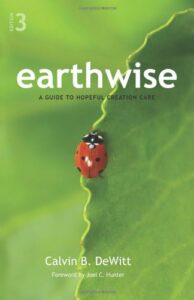 EarthWise: A Guide to Hopeful Creation Care Calvin B. DeWitt (Faith Alive) $16.00 OUR SALE PRICE = $12.80
EarthWise: A Guide to Hopeful Creation Care Calvin B. DeWitt (Faith Alive) $16.00 OUR SALE PRICE = $12.80
This is a real Hearts & Minds classic, now in its third updated edition; we have stocked this brief book since it came out in its first edition in the mid-1990s. It is short and clear. Cal DeWitt is an beloved environmental scientist and prof at the University of Wisconsin-Madison where he serves on the graduate faculties of Environmental and Resources, Water Resource Management, Conservation Biology, Sustainable Development, even something called Limnology. He famously developed the Northern Michigan AuSable Camp into the AuSable Institute, a faith-based environmental studies site where college students can take a semester of field-based courses in environmental science and environmental studies. He has written a lovely little book on being a creation-loving, Christ-following scientist (Song of a Scientist: The Harmony of a God-Soaked Creation) which shows how he so nicely integrates his faith and his work in the science and educational communities.
For all those credentials, scholarly research, and institutional fame, this is a very basic little book with short chapters. They were published by the Christian Reformed Church as an adult small group study book or a Sunday school resource — there are seven chapters, a study guide and closing prayer for each week. Earthwise is a great little study that we are honored to recommend.
 Stewards of Eden: What Scripture Says About the Environment and Why It Matters Sandra L. Richter (IVP Academic) $20.00 OUR SALE PRICE = $16.00
Stewards of Eden: What Scripture Says About the Environment and Why It Matters Sandra L. Richter (IVP Academic) $20.00 OUR SALE PRICE = $16.00
Although this is on the often very scholarly IVP Academic imprint, it isn’t a heady textbook or academic treatise. Richter is known as a lively Bible teacher (with PhD from Harvard she is a member of the Committee for Biblical Translation of the NIV). Her scholarly resume is impressive and many churches (and colleges) have used her serious but wonderfully realized The Epic of Eden: A Christian Entry into the Old Testament. In this recent paperback (about 150 pages) she offers insights about ancient Israelite society and economy and shows “how significant environmental theology is the Bible’s witness.” She has great sections on various mandates given in the Bible to care for the land, for animals, and people on the margins (who are often most vulnerable in times of drought.) Her knowledge of Scripture is impeccable and, as one reviewer notes, “She lays out a Biblical theology that instructs us to steward and care for God’s beautiful creation, not destroy it for our own greed.”
Dr. Richter has been outspoken about a Biblically-based, evangelical theology of creation-care for years and has been influential in both academic circles and as a beloved Bible teacher. (She was at Wheaton College but now teaches at Westmont in California.)
Stewards of Eden is a great book because it is not terribly passionate or emotional (even though it is clear the author cares very deeply and has been working at this for years.) What I mean is that it teaches the material clearly and allows the background and cultural context she offers to illustrate connections to day. There are maps and pictures of artifacts from antiquity. It’s a little nerdy like that. There are pages and pages of footnotes.
And yet, there is a great Appendix which she calls “Resources for Responsive Christians”which is a veritable handbook of practical stuff you can do to be “responsive” to God’s will as shown in Scripture. Her practical bent is evident and this book is going to be really helpful for many.
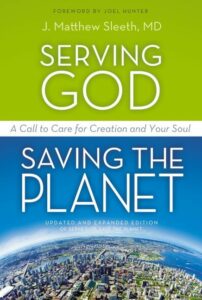 Serving God, Saving the Planet: A Call to Care for Creation and Your Soul Matthew Sleeth, MD (Zondervan) $14.99 OUR SALE PRICE = $11.99
Serving God, Saving the Planet: A Call to Care for Creation and Your Soul Matthew Sleeth, MD (Zondervan) $14.99 OUR SALE PRICE = $11.99
I almost always, always recommend this for those who need a quite readable, almost upbeat overview of the joyful (if serious) call upon humans to care for the Earth. This is a very nice, clear-as-can-be Biblical and theological introduction to the topic that is concise and yet truly fascinating. (There is an appendix, too, that includes great Bible texts and another of great creation-care quotes from various folks down through church history.)
Sleeth was a medical doctor and growing in his apparently new-found evangelical faith. (His heart being “strangely warmed” as the Methodists put it.) In his conscientious work as a doc he realized that so many health problems — just think of asthma and some cancers — may be caused or made worse by environmental conditions. As a doctor wanting to help with public health he turned to the study of pollution and the theological need for a Biblical foundation for ecological activism. Sleeth has gone on to write other books about sabbath keeping (24/6: A Prescription for a Healthier, Happier Life with a great forward by Eugene Peterson and a lovely one about trees in the Bible called Reforesting Faith.) But this little early one is still a classic. And there is a very useful workbook sort of study guide in the back, ideal for those who want concrete steps to process and apply the call to a more frugal, joyful, healthy lifestyle.
As it puts it on the back cover the revised and updated second edition, “With the storytelling ease of James Herriot and the logical clarity of C.S. Lewis, Sleeth lays out the rationale for environmentally responsible life changes and a how-to guide for making these changes.”
By the way, for those who want practical guidebooks, his wife Nancy Sleeth wrote a helpful book called Go Green, Save Green and the fascinating Almost Amish: One Woman’s Quest for a Slower, Simpler, More Sustainable Life
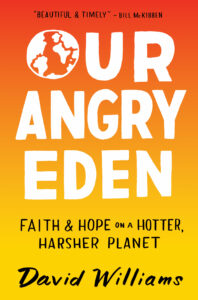 Our Angry Eden: Faith and Hope on a Hotter, Harsher Planet David Williams (Broadleaf) $26.99 OUR SALE PRICE = $21.59
Our Angry Eden: Faith and Hope on a Hotter, Harsher Planet David Williams (Broadleaf) $26.99 OUR SALE PRICE = $21.59
Yep. This is one of the very best new books on this topic and a great read. I was not sure I was going to like this book much, thinking it might be an angry screed. Or some theologically questionable insinuation that God just lets things go to Hades as punishment for our mistreatment of the creation. I knew the author, David Williams, had written a fabulously interesting and critically acclaimed novel (When the English Fall) about how, when a future power grid collapses, the only folks seemingly able to cope are the Amish. (Now that’s an apocalyptic plot you hadn’t thought of, eh? It’s a very good novel, btw.)
As it ends up, I loved the voice and gentle wisdom of pastor Dave, a Presbyterian small church pastor. He proved his bone-fides when he used the phrase “Wee Kirk” but his many years as a small town guy and small church minister was evident from the first pages, from the witty way he described mainline churchy stuff and his love for driving around town in bad weather. (“As anyone who knows me will tell you, I’m the first one out there when severe weather rolls in. When the local news station cuts to Storm Team special coverage, I’m almost giddy.”) And then, in explaining the huge expanse of the eternal cosmos, he said, “Creation is not just our world dagflabbit.” You gotta love a guy who makes up words like that.
There are four units/sections of this fabulous book, but it feels almost like two halves. The first part explores a rather sensible (if not terribly comforting) notion that the creation does get rough and Eden is increasingly angry. He’s not exactly apocalyptic, at least not entirely so, and he isn’t cranky, but some chapters do feel a little like Jeremiah – honest and heartbroken with a bit of hope. And yes, there are chapters like “Too Little, Too Late” as he talks about myopia and inertia, growth and greed. Williams takes climate change seriously, with a tone implying that, well, this really shouldn’t surprise us, given our idols and profligate living at least since the industrial age, and certainly in these recent most foolish decades. He is honest (some might say harsh) about the data which he explains well. Yes, he uses words like lollygagging and he tells stories about his lovely church people — Jesus folk, he calls them — that sound almost charmed, like his Poolesville Presbyterian is in some suburb of Stars Hollow, or, better, Mitford. But don’t be fooled: this is an urgent cry, a prophetic warning. He’s damn serious about how little time we have left to tone down the demonstrably “hotter, harsher planet.”
The second half is also urgent, but considerably more homey. Again, Williams brings his small-town, awe-shucks, pastoral wisdom to invite us to live the Christian life in ways that are kind, frugal, sensible. He has several chapters under the heading “How We Face the Crisis” and it is strong and sane; wise public theology offering moral guidance for our personal lives, our churches, and society. He works at questions of why we are less engaged than we should be and offers insight in ways that Bill McKibben calls “beautiful and timely.” The back cover calls it an “unflinching yet hopeful call to faithful action” and that is a very good description.
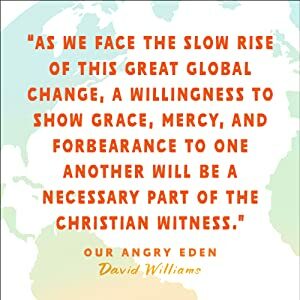 The last handful of chapters are shorter and plentiful as he tells stories and preaches some and offers us on-ramps and first steps and moral arguments for living well in the face of this very real climate crisis. He is charming and funny — eating a vegetarian diet is an important way to cut personal carbon emissions, as we all know, and he colorfully (and graciously) describes cooking backyard steaks on the grill for his family or guests as he grills his modest veggies. He is a born storyteller, it seems, and weaves his narratives from the personal to the public, from moral urgency to delightful freedom. We all are called to be responsible and he has opinions, lots, actually, of what we might do. He invites and evokes, but the book is anything but angry. It is one of my favorite books of this hot summer. Very highly recommended.
The last handful of chapters are shorter and plentiful as he tells stories and preaches some and offers us on-ramps and first steps and moral arguments for living well in the face of this very real climate crisis. He is charming and funny — eating a vegetarian diet is an important way to cut personal carbon emissions, as we all know, and he colorfully (and graciously) describes cooking backyard steaks on the grill for his family or guests as he grills his modest veggies. He is a born storyteller, it seems, and weaves his narratives from the personal to the public, from moral urgency to delightful freedom. We all are called to be responsible and he has opinions, lots, actually, of what we might do. He invites and evokes, but the book is anything but angry. It is one of my favorite books of this hot summer. Very highly recommended.
Our Angry Eden by David Williams is a must-read. With clear-eyed honesty and a perceptive analysis of the existential threat of the climate crisis, Williams forces us to face the mess we are in, but he also conjures hope through lively storytelling, biblical insight galore, and sound practical ideas that embody God’s good future. This is one of the best books I have read on what it means to follow Jesus in this tumultuous time.—Steve Bouma-Prediger, author of For the Beauty of the Earth: A Christian Vision for Creation Care and Earthkeeping and Character: Exploring a Christian Ecological Virtue Ethic
In a time when the words climate emergency send many people into a panicked despair or an overwhelmed paralysis, David Williams offers a third way. This book gives attainable, tangible ways to engage, while spreading out a rich theological foundation for how to love our neighbor as we care for our earthly home. –Anna Woofenden, author of This Is God’s Table: Finding Church Beyond the Walls and founder of The Garden Church
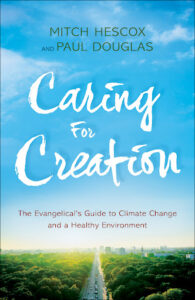 Caring for Creation: The Evangelical’s Guide to Climate Change and a Healthy Environment Mitch Hescox & Paul Douglas (Bethany House) $16.00 OUR SALE PRICE = $12.80
Caring for Creation: The Evangelical’s Guide to Climate Change and a Healthy Environment Mitch Hescox & Paul Douglas (Bethany House) $16.00 OUR SALE PRICE = $12.80
One of the very best introductions, especially if you want an easy to read book by trusted evangelical leaders who are balanced and compelling. If you are interested you can see my more elaborate review from our September 2016 BookNotes review when we first announced that we were bring these two authors into the store. You can read that HERE https://www.heartsandmindsbooks.com/2016/09/pre-order_caring_for_creation/
The short version is that Mitch is a good friend, the President and CEO of the Evangelical Environmental Network (who lives in York County) who is a preacher at heart and a down-home evangelist, even as he has been called to this work as a public faith leader and organizers. His co-author and pal, weatherman extraordinaire Paul Douglas, was a delight to meet and he brings wonderfully explained scientific information to the book. And, yes, we had Paul recite his one line (that made him a bona fide movie star) from his small role as a weather forecaster in Spielberg’s Twister. Paul got to know Spielberg when the great director used in Jurassic Park some new Doppler type technology Paul invented. Paul is a leading consultant in weather patterns and climate change for major businesses, industry, and government and is a heck of a nice and altogether reasonable guy.
I don’t know if it makes much of a difference but for what it is worth, both authors are fairly conservative theologically and politically. They are Republican evangelicals and some of the most informed faith leaders in the who question of climate change. Mitch, a United Methodist pastor, interestingly, used to work in the coal industry and knows much about international global technology transfer. When they offer practical solutions for which we can reasonable advocate it is like gold. We should allow these guys to bring us up to speed and life more faithfully. Caring for Creating is a very good starter book and a very good mid-level book if you study the charts and graphs.
Want to know more about the EEN organization mentioned above? Check out the Evangelical Environmental Network (which Rev. Hescox serves as President) here.
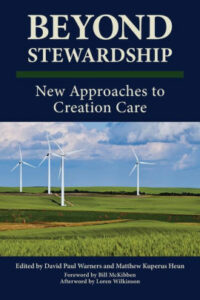 Beyond Stewardship: New Approaches to Creation Care edited by David Paul Warners & Matthew Kuperus Heun (Calvin College Press) $17.99 OUR SALE PRICE = $14.39
Beyond Stewardship: New Approaches to Creation Care edited by David Paul Warners & Matthew Kuperus Heun (Calvin College Press) $17.99 OUR SALE PRICE = $14.39
I adore this book and wish it was better known. It isn’t arcane or too heady but is sophisticated, provocative, and really engaging. We first reviewed it back when it came out (in August 2019) and celebrated it in a post that was dedicated to books by indie and boutique publishers that we liked or authors with whom we had some particular connection. We are especially fond of this book for these very reasons. We know a few of these authors, including one of our very best friends in the world, a woman we greatly admire for her work on a variety of social issues, but, most recently, for being on a team overseeing an audacious project of cleaning up a large creek running through Grand Rapids, Michigan. You’ll see Gail Heffner’s beautifully rendered chapter (on environmental racism, actually) described in my (only slightly edited) comments below, first published in our BookNotes on August 28, 2019. I hope it inspires you to consider this fabulous volume. Here’s some of what I wrote:
Beyond Stewardship is a major new work and could have been released on a big-time, well-known publisher because Beyond Stewardship is brilliant in its overall vision and wonderful in how it has offered so many interesting, astute, and vitally important contributions to the conversations about faith and creation-care. This fascinating and generative book deserves much attention!
Here’s the basic gist: Beyond Stewardship is a collection of about 15 chapters offered by a wonderful crew of interdisciplinary scholars who invite us to think whether “stewardship” is the best way to describe humankind’s relationship with the other-than-human creation. For decades, theologians (especially those within the evangelical tradition who want to be intentionally shaped by the Bible) have drawn on the deep and rich notion of being house-holders, care-takers, managers and vice-regents of God’s good but fallen world. Stewardship, we often say, is more than giving money to church (as it has woefully been reduced to within the common church-goer’s imagination.) It is caring for resources and managing them well.
It may come as a surprise to many, but this really is a live question: is this actually the best way to talk about what Genesis calls oikonomia, the home-making calling to tend and keep the economy of the garden? It may not take too much consideration to see that it may not be fruitful to think of ourselves as “over” the other creatures, distant from, “using” them. This fine book from Calvin College Press is a tremendous and important conversation about that question. Is talking about our “stewardship” of the creation Biblically adequate and is it helpful? The authors say no; we need a better way to describe our human relationships with other creatures and our vocation to “serve and protect” the cosmos.
Here are three quick things that might inspire you to order this from us. First, I’m happy to say that one of the authors in this book is one of our very best friends, Gail Gunst Heffner, who has for years, with other colleagues and students at Calvin College (now University) been painstakingly and lovingly working to restore a deteriorating stream in their Grand Rapids area watershed. The “Plaster Creek Stewards” have gotten some national attention and their deep involvement helping the college use its resources to serve the community has helped many of them, Gail included, to increasingly doubt the ultimate usefulness of the “stewardship” model. (Gail’s chapter in Beyond Stewardship is on what is often called environmental racism and it is clear, succinct, tender, and prophetic.) Gail used to work for the Pittsburgh-based campus ministry organization, the CCO, and is truly beloved by so many. I know some of our customers know her so you should buy this book!
Secondly, Gail isn’t the only person in this book we admire. Steven Bouma-Prediger (who teaches at Hope College and whose books are mentioned in this column) has a lovely piece I adored, making the overt case why we should “move from stewardship to earthkeeping.” James R. Skillen (son of the political scientist and founder of CPJ) uses his expertise in geology to get at the topic in light of the Biblical teaching of the Kingdom of God. There are other Calvin profs who have made vital contributions – English professor and wondrous writer Debra Rienstra has a chapter called “What’s That? Naming, Knowing, Delighting, Caring, Suffering” that is a great essay helping us to reorient our imagination and find hopeful ways forward. The piece “From Stewardship to Place-making and Place-Keeping” resonated with me a lot. Editor David Paul Warners has a beautiful chapter called “Walking Through a World of Gifts.”
There’s so much in this great book. There is an art piece, a delightful student contribution, excellent discussion questions and other creative touches. Contributors include the likes of Aminah Al-Attas Bradford, an ordained CRC minister and a PhD candidate at Duke; she is theologian who knows her way around the sciences, a scholar of both Barth and microbes. Matthew Halteman has written on our relationship with animals and co-editor Matthew Kuperus Heun is a professor of engineering. One author is a city and regional planner, another teaches economics. One is climate change activist, another tells of outdoor educational experiences. All of these involved scholars are deeply committed to notions of sustainability and asking big questions about a faithful worldview and how to live into God’s ways in God’s world.
There is a great afterword by the great Loren Wilkinson whose book Earthkeeping was the first book (in the late 70s) produced through the Calvin Center on Christian Scholarship and very important in my own journey to understand some of this stuff. They grappled with the word stewardship in those years and his story (shared briefly, co-authored by Cal DeWitt and Eugene Dykema) offers a very nice historical touch. For those who have followed this movement over the years, is nearly worth the price of the book. For others, it frames this very contemporary multi-disciplinary re-think by some older thinkers and earth-keepers. Beyond Stewardship: New Approaches to Creation Care edited by David Paul Warners & Matthew Kuperus Heun is a true gem.
Check out the fun and nearlly stunning “Illustrated Guide” to Beyond Stewardship” by browsing around this website, with a link for pictures and more info for each chapter.
Scroll down to the bottom of the book’s webpage to find a podcast interview with each author of each chapter of Beyond Stewardship. This creative resource helps you hear these good scholar/activists and learn more about why they wrote each chapter as they did. Very nice. And then back and order a few from us for your next book club or study group.
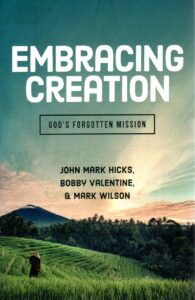 Embracing Creation: God’s Forgotten Mission John Mark Hicks, Bobby Valentine & Mark Wilson (Leafwood Publisher) $14.99 OUR SALE PRICE = $11.99
Embracing Creation: God’s Forgotten Mission John Mark Hicks, Bobby Valentine & Mark Wilson (Leafwood Publisher) $14.99 OUR SALE PRICE = $11.99
Here is a review I offered a bit ago — it is such a Biblically insightful book I wanted to suggest it again.
This wonderfully done book is so refreshing and interesting as it relates a wonderfully robust view of new creation in the Bible to our environmental crisis. It invites us to explore the full story of God’s work in the world — God, creation, humanity, sin, redemption, promises of restoration. It draws on brilliant and well-known friends of ours such as Richard Middleton, Al Wolters, and N.T. Wright, as well as some of the finest Christian thinkers about environmental science and creational stewardship. All three authors have advanced seminary degrees and are not only Biblically astute, but have studied church history and know flow of ideas, the ups and downs of theological insights and how they have been applied. Hicks teaches at Lipscomb (he earned his PhD from Westminster Theological Seminary) while Valentine is a pastor in Tucson AZ. Mark Wilson (whose first Master’s degree was in biology) has worked for 36 years in conservation through the United States Fish and Wildlife Service. How great is that?
I really, really liked Embracing Creation and it offers a fabulous framework for thinking well about our mission in the world. It explores creation and new creation from the perspective of what is called in American church history the “Stone Campbell Movement” that gave rise to the Church of Christ denomination. Each chapter ends with some take-away bullet points and excellent discussion questions. It is very nicely done and I happily recommend it.
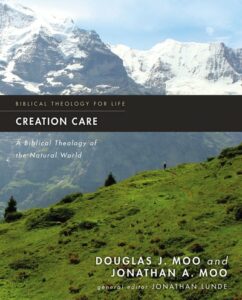 Creation Care: A Biblical Theology of the Natural World (in the “Biblical Theology for Life” series) Douglas J. Moo & Jonathan A. Moo (Zondervan) $24.99 OUR SALE PRICE = $19.99
Creation Care: A Biblical Theology of the Natural World (in the “Biblical Theology for Life” series) Douglas J. Moo & Jonathan A. Moo (Zondervan) $24.99 OUR SALE PRICE = $19.99
These slightly oversized books are personal favorites and we recommend them all — they are offering Biblically-based overviews of a topic, from one on discipleship to one on the Kingdom of God, one on wealth and one on mission. This one, as you can see, is a study of creation care.
And we love it. Creation Care: A Biblical Theology is co-authored by a lovely father and son team. Dad Moo is a very esteemed New Testament scholar and son Jonathan (with a PhD from Cambridge) teaches environmental science at Whitworth University. It is a clear and solid overview of much the Biblical material, very well done and super intersting. In fact, no less a scholar (who has written bout this very thing) as Richard Baukham says it should be considered the standard work. Rave reviews on the back and inside are from activity like Bill McKibben and Ben Lowe, Biblical scholars like Tremper Longman and Chris Wright, and church leaders like Russell Moore.
Listen to Ed Brown (director of the excellent organization Care of Creation), who says of it,
In 2012 the Jamaica Call to Action, which one of the authors assisted in writing, called for ‘new and robust theological work,’ including ‘an integrated theology of creation care.’ Douglas and Jonathan Moo’s work in Creation Care is exactly what we need. Beautifully written, it nonetheless provides a deep understanding of the exegetical, theological, scientific, and even practical issues involved in a Christian examination of this important area. Creation Care should become the standard text for any course on environmental theology and required reading for any pastor who wants a solid biblical framework for understanding and teaching about creation care.
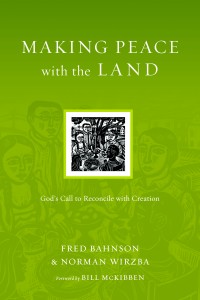 Making Peace with the Land: God’s Call to Reconcile with Creation Fred Bahnson & Norman Wirzba (IVP) $18.00 OUR SALE PRICE = $14.40
Making Peace with the Land: God’s Call to Reconcile with Creation Fred Bahnson & Norman Wirzba (IVP) $18.00 OUR SALE PRICE = $14.40
Again, this is a little book that we have raved about over and over. It is part of the remarkable series of books about reconciliation published by IVP and Duke Divinity School’s Center for Reconciliation. (There are a good handful in the series, the first being Reconciling All Things: A Christian Vision for Justice, Peace and Healing by Emmanuel Katongole and Chris Rice.) They each are done by one who is a scholar or professor while the co-author is practitioner. (In this case it isn’t much of a distinction as both authors are serious thinkers and have plenty of dirt under their fingernails, although I suppose Wirzba is pitched as the scholar while Bahnson is a farmer.) Making Peace with the Land it is truly one of the very best, a moving and nicely written study of God’s reconciling work bringing together all things on heaven and Earth, including Earth. It does this by taking a good look at farming, food, and eating. From serious study of unsustainable agricultural practices to daily living in alternative communities, this splendid study helps us appreciate creation and embody stewardly lifestyles, aware of God’s great care to bring healing to the land itself, even in how we experience our food. Highly, highly recommended for growers or eaters. Forward by Bill McKibben.
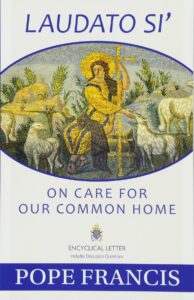 Laudato Si’ – On Care for Our Common Home Pope Francis (Our Sunday Visitor) $12.95 OUR SALE PRICE = $10.36
Laudato Si’ – On Care for Our Common Home Pope Francis (Our Sunday Visitor) $12.95 OUR SALE PRICE = $10.36
Here are my remarks from one of our Booknotes “Best Books of 2015” column, posted in January of 2016. I wanted to celebrate this good book again, which still remains an excellent resource for any of us wanting a clear but profound analysis of climate change from a faithful and Biblical perspective.
I suppose you know about Encyclical Letters, the rare and formal times a Pope offers to his Roman Catholic flock and the listening world a declaration of what he takes to be God’s will, Christian truth for the church and for the cultures of the world. Much has been made of Pope Francis’ radical ways — that he took the namesake of the old Saint Francis of Assisi is important — and his own former ministry among the poor in his native South America influenced him significantly.
Not everyone knew, at least until this document, that besides being a priest among the poor Pope Francis also has an advanced degree in the sciences, and is a thoughtful, if not professional, political philosopher as well. Nearly anyone who reads this remarkably important Papal Encyclical will quickly realize both. Francis is a great preacher and gentle spiritual writer and many of his devotional books have come out in the last year or so. This important formal piece, though, that was released this past summer, is exceedingly important, and exceptionally astute.
Two quick comments: Laudato Si: On Care for Our Common Home places the Christian concern about climate change in the theological context of our human duty to care for God’s creation; it keeps God in the discussion at all points. (Indeed, the Latin phrase in the title means “Praise Be to You!”) I suppose Francis hasn’t read the Norman Wirzba book From Creation to Nature [another book we awarded as a “Best of 2015”] but both that book and the Pope’s own intellectual influences would agree: secularizing modernity effected both how we view God and thereby how we view the cosmos and therefore the way we fall into idolatry, such as reducing progress to mere economic growth. Once we realize God’s great delight in God’s own world that He so loves, we ourselves can see our own vocation of creation care as a divinely charged obligation and privilege.
So — Laudato Si is good creational theology rooted in a history of ideas, and analysis of the complexity of human cultures and a good example of thoughtful Catholic scholarship regarding economics and markets, politics and governments, various institutions and civic life, global cooperation and the need to work hard at naming and working towards an ethic of the common good.
For an exceptional bit of Protestant appreciation of and evaluation of the Pope’s Letter, see the wonderful two part piece by Jonathan Chaplin Comment magazine, here and here. After reading this detailed review you will want to get the Encyclical itself. How great that in 2015, a Catholic Pope can write a detailed analysis of God’s role in the world, the dangers of climate change, and the inadequacies of science and markets alone to solve our cultural malaise, in such a way that it ends up being discussed, even with its Latin title, in the secular Western media as well as among Christian folks of all sorts. This really is a little miracle, and we are grateful to play a part, selling copies here, and commending it to you as a very important, mature bit of Christian writing. I say Gratias Deo.
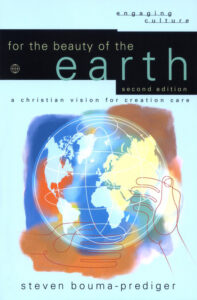 For the Beauty of the Earth: A Christian Vision for Creation Care Steven Bouma-Prediger (BakerAcademic) $28.00 OUR SALE PRICE = $22.40
For the Beauty of the Earth: A Christian Vision for Creation Care Steven Bouma-Prediger (BakerAcademic) $28.00 OUR SALE PRICE = $22.40
I once said not too many years ago that this was the most important book yet done on a uniquely Christian perspective on the environmental crisis and the Biblical call to creation care. Other work continues to be released, including, recently, the excellent one by Steven himself. (See Earthkeeping and Character, below.) Still, For the Beauty remains one of the very best, exceptionally thoughtful, utterly serious, and a must-read for anyone who cares for the earth and appreciates her beauty. As with his other work (like the breathtaking Beyond Homelessness: Christian Faith in a Culture of Displacement co-written with Brian Walsh) Bouma-Prediger offers not just Bible verses about stewardship or ecology; he frames this robust Biblical theology with a profound, nearly prophetic understanding of our idolatrous times. Some of this is nearly poetic, and most is quite beautiful, including solid environmental science, informed by great Biblical wisdom. Dr. Bouma-Prediger is a popular professor at Hope College.
Here is the table of contents:
- Introduction: Ecology and Theology in Dialogue
- 1. Where Are We? An Ecological Perception of Place
- 2. What’s Wrong with the World? The Groaning of Creation
- 3. Is Christianity to Blame? The Ecological Complaint against Christianity
- 4. What Is the Connection between Scripture and Ecology? Biblical Wisdom and Ecological Vision
- 5. How Should We Think of the Earth? A Theology and Ethic of Care for the Earth
- 6. What Kind of People Ought We Be? Earth-Care and Character
- 7. Why Worry about Galapagos Penguins and the Jack Pine? Arguments for Earth-Care
- 8. Where Is There Hope? Christian Faith at Home on Earth
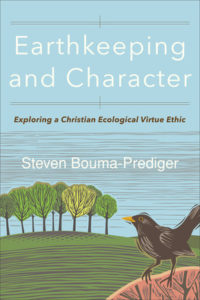 Earthkeeping and Character: Exploring a Christian Ecological Virtue Ethic Steven Bouma-Prediger (Baker Academic) $24.99 OUR SALE PRICE = $19.99
Earthkeeping and Character: Exploring a Christian Ecological Virtue Ethic Steven Bouma-Prediger (Baker Academic) $24.99 OUR SALE PRICE = $19.99
Okay, I mentioned above that For the Beauty of the Earth is one of the best serious books on this vital topic. Indeed, it is. But, well, this more recent one by the same great author (Hope College prof, Steven Bouma-Prediger) has maybe topped it. This book came out at the very end of 2019 so we squeezed onto our “Best Books of the Year” post in January 2020. Yes!
Here is an only slightly edited version of the long review I posted in November 2019 of Earthkeeping and Character. I really hope you find it interesting. I learned so much reading the book and want to tell you what it’s all about.
Have you ever hugged a book? I mean, right in the middle of it you are just so grateful, so glad, so appreciative that you just hold its pages to your chest and smile and whisper a prayer of thanksgiving?
If not, I hope you don’t think I’m too weird, but I did this with the new release by Professor Bouma-Prediger. It’s hard to explain why I am overcome with joy for this title but I suspect it is partially because I’m so glad for a book that is truly pioneering — making a reader feel like he or she is in on something vital and groundbreaking and redemptively new; the Lord doing that new thing promised in Isaiah 43 perhaps? It is also my gladness for seeing a scholar that writes so well, a good storyteller who knows his philosophy, a professor that is as keen on telling about kayaking technique or his love for the Northern Lights as he is on the history of the sacred-secular dualism in Western rationalism or the scholarship behind certain schools of theological thought.
Further, I am nearly verklempt whenever I see a seriously Reformed Calvinist who is fluent in Catholic theology and spirituality and when I see an evangelically-oriented Bible scholar who cites so widely across the theological spectrum (in this case, from Lutheran Joseph Sittler and German Reformed Jurgen Moltmann.) Bouma-Prediger so deftly weaves into his scholarship gracious moments by citing the likes of poetry by Wendell Berry and Mary Oliver and profound excerpts of Nicholas Wolterstorff and Sylvia Keesmaat and Tom Wright. I believe this book’s content and teaching is exceptionally important and I commend it urgently; aside from its significance, I recommend it for how it is a model of generous, interesting, relevant, elegant scholarship.
I have read Steven’s excellent book on creation care For the Beauty of the Earth and the extraordinary co-authored volume (with Brian Walsh) called Beyond Homelessness: Christian Faith in a Culture of Displacement. (We even stock his deep Oxford University Press book The Greening of Theology where he compares the ecological models of Rosemary Ruether, Joseph Stiller and Jurgen Moltmann.) He is a scholar who you should know and has done books you should read. Listen to A.J. Swoboda, author of Subversive Sabbath:
Bouma-Prediger’s groundbreaking For the Beauty of the Earth woke many up to Christ’s call to care for the earth. One might struggle to imagine how he could top that prophetic book. He has done it. This book could change the way we think about discipleship. And it will change the way we think about how a discipled people can transform the world.
Listen to Jonathan Moo, environmental science prof at Whitworth University, (who co-authored the splendid Creation Care: A Biblical Theology of the Natural World with his father, the famous New Testament scholar, Douglas Moo) who says:
“This book cements Bouma-Prediger’s reputation as one of our best thinkers and writers on the most important issue facing Christians today: how we relate to God’s creation and care for it well in a time of profound crisis. This important book will now be required reading in my environmental ethics courses.”
You should realize that this book really is covering a topic that is unlike any other accessible Christian creation-care book we know: it is, as it says, about character; that is, about virtue ethics. Let me explain.
In a moving story in the beginning Steven and some students are hiking and as they come to their wilderness campground, the find the place nearly trashed — litter strewed, burnt logs and ashes scattered, bark stripped from the glorious white birches. “What kind of a person would do a thing like this?” a student cries? And, conversely, Steven revisits the story and comes across a wonderfully well-kept spot, protected, nurtured, stewarded. And the question remains: “What kind of people do something like this?”
And so, we start a journey that I found very helpful and – as many have said in recent decades – is exceptionally important; namely, a study of virtue ethics. That is, we need more than the standard sort of right vs. wrong mentality that asks us to do the right thing out of duty, obedience, a proper response to the rules. Rather, some have said (including Aristotle, or, in our day, Alistair McIntyre and Stanley Hauerwas) that a more helpful and fruitful and lasting kind of ethics isn’t just merely our duty to do right, but the question of being a good person; that is, a virtuous person who wants to do the wise and good thing. It ends up, there is a large difference between a person who is dutiful to obey the rules, to do good, and a person who desires to be good.
Bouma-Prediger is a great teacher and he not only explains what is meant by virtue ethics and how that school of thought (about character formation, not merely obedience to ethical principles) is an important aspect of uniquely Christian and deeply human ways of being a good person. And then, just when it was getting interesting, he makes it even all the more interesting by telling us about a recent school of thought in our generation about Environmental Virtue Ethics, known as EVE in the biz, apparently. Who knew?
So, within the environmental studies field there is some insider baseball stuff about whether we need to go deeper than passing environmental legislation and policies to save the planet but to the question of what kind of people we must be if we are going to serve our fellow creatures in that capacity. And, of course, to answer that, even though Aristotle and other virtue ethicists can help, people admittedly need deeper, perhaps more sustainable voices, calling us to a view of our selves and our role within creation. Perhaps our sacred story revealed in the Bible can help.
I love that Bouma-Prediger writes unashamedly as a person of deep Christian faith. He is an evangelically-minded professor at a Christian college (Hope College is affiliated with the Reformed Church of America.) And yet, he writes as if any seeker or nature lover or person curious about ethics and living well, might be listening in. He is like one of his heroes in this regard, the late, great Lewis Smedes. Smedes was a Dutch neo-Calvinist at Calvin College who did seriously Reformed work in Biblical studies and theology, alongside friends like Nicholas Wolterstorff, Richard Mouw and Alvin Plantinga. Near the end of his days, Smedes was writing delightfully wise articles for places like Readers Digest offering all sorts of readers a Biblical worldview without the lingo. Smedes asked us to be “pretty good people” and guided us towards virtues and hope and goodness with grit and grace, in language the whole world could understand.
Bouma-Prediger is perhaps more interested in Biblical exegesis than Smedes was (then, near the end of his career when we was writing books for a wider, popular audience) and he remains a studious scholar, but he has this charming sense that in writing about Christian ethics and Biblical perspectives and theologically informed virtuous ways of being in the world, he is not just calling out to church-folk and Christ-followers but all who care about the state of the Earth.
Earthkeeping and Character, then, could be – Lord, please! – a major contribution to two conversations, received by two main audiences. It will surely deepen the Christian work of thinking about – and doing something about – the crisis of the creation and our call to steward well our role in creation’s ecology. Anyone in the Christian tradition writing about creation-care or Earthkeeping or environmental stewardship and the like will simply have to grapple with his wonderful insights and vital proposals. This includes not just ecologists and activists, but Bible scholars, theologians, outdoor education leaders, those in camping ministries, youth pastors and more.
But, secondly, E & C could be a contribution to the broader world of environmental studies and those working on EVE. Dr. Bouma-Prediger knows the major textbooks and other people of Christian faith who have contributed wisely, profoundly, to this developing academic discipline. (This, too, is a remarkable feature of the book, how he interacts with these other key texts and figures, religious or otherwise, making some serious stuff so very interesting.) May this book be seen not as an in-house religious resource for church folk only, but the serious contribution that it is to mainstream environmental ethics.We need all hands on deck and only the most fundamentalist secularist would ignore this helpful vision for having something substantive to offer.
(One thing that I like which all might ponder: he does not like the word “environment” much, and prefers the more wholistic, nuanced word “ecology.” He explains why, using the Bible, naturally, and he cites Saint Wendell on this – I hope you know Wendell Berry’s good rant in Sex, Economy, Freedom, Community. Bouma-Prediger’s pages explaining this is simply wonderful and we should consider well his linguistic insight.)
I wish I could walk you through his marvelously ecological vision of virtues and vices, showing how such character traits have such vast repercussions for our role in God’s creation. Nobody has written this stuff with such passion, wisdom, and verve. He looks at wonder and humility, self-control and wisdom, justice and love, and courage and hope. The stories and examples are thrilling, the trajectory of this both exciting and a bit challenging, if not overwhelming. Can we become these kinds of people, the kind the planet needs? And how does it happen?
Can we make the time to slow down, to experience creation, to reflect on who we want to be in our vocation in our watersheds and places?
Well, it might happen as we, at least, follow in the ways of others. Character ethics are transmitted like that – by mentors, in community. (Ahh, remember Steve Garber’s Fabric of Faithfulness: Weaving Together Belief and Behavior which showed how young adults, especially, move from head to heart, from abstract convictions to ways of life, by watching a mentor?) And so the good explanations of virtue and vice, the ruminations on character, the teaching on how classic Christian virtues apply to our stewardly care for fellow creatures, adept analysis of various aspects of how the creation is groaning, are illustrated by stories, examples, episodes, people. Yes, by slowly working with this profound book we can be changed. In fact, not only does Steven introduce us to places and stories and people, he himself is one such model for us all.
Listen to his friend Brian Walsh, who has also written a bit about Biblical virtue and ecological crisis in the recent Romans Disarmed:
“Bouma-Prediger can only write about the shaping of ecological virtues because his own life is such a brilliant testimony to the character of an earthkeeper. He has gifted us with a philosophically astute, ecologically attuned, and biblically profound meditation on ecological virtue.”
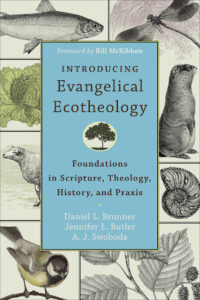 Introducing Evangelical Ecotheology: Foundations in Scripture, Theology, History and Praxis Daniel L. Brunner, Jennifer L. Butler, A. J. Swoboda (Baker Academic) $30.00 OUR SALE PRICE = $24.00
Introducing Evangelical Ecotheology: Foundations in Scripture, Theology, History and Praxis Daniel L. Brunner, Jennifer L. Butler, A. J. Swoboda (Baker Academic) $30.00 OUR SALE PRICE = $24.00
I can hardly believe this book came out in 2014; I still think of it as quite recent. It is so, so good and we tried to honor it by naming in one of our “Best Books” of that year. Here is what I wrote in that round-up award show (okay, not a real show) in January of 2015. This great book deserves a more in-depth review — I hope I entice you here:
We have a very large selection of books about creation care, climate change, environmental stewardship and green living. Each year we preview bunches, and stock a good number. This, without a doubt, is the stand out volume of the year, certainly the best theological work on this topic in years. These authors are creative and thoughtful evangelicals, solid, passionate, and yet remarkably fluent with other faith traditions, and, of course, with the science of climate change, pollution and the like. This has rave reviews from wise and trusted authors — Norman Wirzba, Steven Bouma-Prediger, Leonard Sweet, and Rev. Fletcher Harper, the ecumenical director of GreenFaith. I hope you don’t mind the phrase “eco-theology” or think it is odd in the title of this book. This is a really solid theological study.
These three co-author scholars are from George Fox University and are exceptional, and, nicely, they bring an interdisciplinary touch: Brunner is professor of Christian history and formation, Butler is a UCC pastor and instructor in Earth-keeping, and A.J. is a professor of Biblical studies. (He, by the way, has edited an extraordinary volume of Pentecostal theologians and ethicists profoundly grappling with earth-keeping and environmental justice. Did you know the founder of Earth Day was a pacifist Pentecostal? Learn more on that in Swoboda’s other recent book, Blood Cries Out: Pentecostals, Ecology, and the Groans of Creation.) For now, Introducing Evangelical Ecotheology deserves a very green Award of Merit. Cool they used the term eco-theology, too. And what a great cover! Good for them!
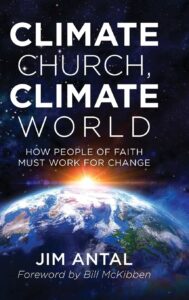 Climate Church, Climate World: How People of Faith Must Work for Change Jim Antal (Alban Institute/Rowman & Littlefield) $25.00 OUR SALE PRICE = $20.00
Climate Church, Climate World: How People of Faith Must Work for Change Jim Antal (Alban Institute/Rowman & Littlefield) $25.00 OUR SALE PRICE = $20.00
This is one of those books that some have found really useful — it is very comprehensive, teaching us so much about so much, but each chapter moves towards application. It is not simple or quick but the chapters are reasonable and designed for Adult ed or church groups. There are discussion questions (and small group suggestions) for each chapter and the writing is pointed at ordinary, mainline denominational churches. Jim Antal is a fireball, legendary for his zeal and faith and energy and humor. He serves as the national spokesperson on climate change for the United Church of Christ and many of our local (small town, culturally conservative central Pennsylvania) UCC congregations have worked through this big book. Hooray.
Listen to Desmond Tutu as he invites you to consider this book for your use:
Jim Antal shows how the church can engage the urgent moral crisis of climate change. This book will inspire both the courage and conviction people of faith need to provide the leadership necessary to realize God’s dream of a just world in which humanity is reconciled to all of creation.–Archbishop Emeritus Desmond Tutu
Or listen to our always generous friend (who is always happy to talk about creation), Brian McLaren, who says:
If you ever meet Jim Antal, your first thought will be, ‘This man has the energy of a dozen people wrapped up in one body.’ You’ll see his brilliance, his enthusiasm, his focus, and his resilient determination. You’ll also see his faith. You’ll sense all of these qualities in Climate Church, Climate World. You will be drawn from well-written page to page, until you have to put the book down and join the movement to . . . quite literally . . . save the world. On top of being brilliant, energetic, and inspiring, Jim Antal is, in my opinion, 100% right, and his message is prophetic in the truest sense.–Brian D. McLaren, author of The Great Spiritual Migration
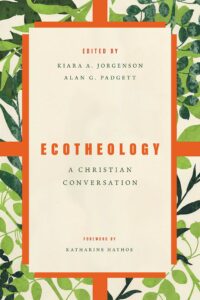 Ecotheology: A Christian Conversation edited by Kiara A. Jorgenson & Alan Padgett (Eerdmans) $24.99 OUR SALE PRICE = $19.99
Ecotheology: A Christian Conversation edited by Kiara A. Jorgenson & Alan Padgett (Eerdmans) $24.99 OUR SALE PRICE = $19.99
Perhaps like you, I’ve got a stack of books I’m very eager to read but just haven’t gotten to them yet. This is on that stack for me, on a short list of books I’ve heard such good things about (the Christian Century review was very good.) It’s a book that looks so engaging and interesting — in fact, the roundtable conversation approach really is attractive. The authors in this conversation, too, are very important and respected voices, and represent some different vantages points so this really does look like a major contribution, a really helpful volume. I love these “point-counterpoint” books that invite conversation and consideration. It is not, I might clarify, a “pro vs con” approach as all conversation partners are deeply committed to a theologically-shaped ecological worldview and are themselves deeply involved in environmental education and activism.
As it says on the back cover, “In roundtable format, Richard Bauckham, Cynthia Moe-Lobeda, Steven Bouma-Prediger, and John F. Haught navigate the layers of what it means for humans to live in right relationship with earth’s lifesystems. After each contributor’s essay, the other three contributors issue a response–including points of disagreement and questions–thereby modeling for readers productive and respectful dialogue. The ecumenical conversations in Ecotheology represent the diverse viewpoints of contributors’ theological and practical commitments, exploring creation care through a variety of frameworks, including natural science, biblical studies, systematic theology, and Christian ethics.”
The four authors are diverse theologically, but all well worth hearing. Richard Bauckham, as you may know, is a brilliant Anglican Bible scholar who taught at Saint Andrews in Scotland, having studied at Cambridge. He is highly regarded throughout the world in the elite class of major Bible scholars, perhaps compared to Jorgen Moltmann, Walter Brueggemann, Tom Wright, Richard Hays, Michael Gorman, etc.) Cynthia Moe-Lobeda is a progressive Lutheran scholar and activist. With a PhD from Union, she now teaches at Pacific Lutheran and the Graduate Theological Union in Berkeley. She has lectured all over the world and is known for her most recent book, Resisting Structural Evil: Love as Ecological-Economic Vocation. I described two of Steven Bouma-Prediger’s books above; he has two Master’s Degrees, one in philosophy from ICS in Toronto and a second in theology from Fuller; he got his PhD from the University of Chicago and is now a Professor of Reformed Theology at Hope College in Holland, MI and is an ethicist by training, an avid outdoors-person, and a great teacher. Dr. John Haught is Distinguished Research Professor Emeritus at Georgetown and is a prominent Roman Catholic theologian and philosopher of science; he has written over 30 books and, as know first hand, is a delightful presenter. The foreword is by one of the leading scientists in the world today and an outspoken evangelical Christ. (We are, by the way, taking PRE-ORDERS for her forthcoming book, due in September 2021, to be called Saving Us: A Climate Scientist’s Case for Hope and Healing in a Divided World (Atria) $27.00.) Katharine Hayhoe is a climate scientist and chief scientist for The Nature Conservancy. She is also a Professor in Public Policy and Public Law and Paul W. Horn Distinguished Professor at Texas Tech University.
Here is the table of contents of Ecotheology: A Christian Conversation so you can see for yourself if this sort of discussion would be edifying for you.
- Foreword: Katherine Hayhoe
- 1. Being Human in the Community of Creation, Richard Bauckham
- Response from Moe-Lobeda
- Response from Bouma-Prediger
- Response from Haught
- 2. Love Incarnate: Hope and Moral-Spiritual Power for Climate Justice, Cynthia Moe-Lobeda
- Response from Bauckham
- Response from Bouma-Prediger
- Response from Haught
- 3. The Character of Earth-Keeping, Steve Bouma-Prediger
- Response from Bauckham
- Response from Moe-Lobeda
- Response from Haught
- 4. The Unfinished Sacrament of Creation: Christian Faith and the Promise of Nature, John F. Haught
- Response from Bauckham
- Response from Moe-Lobeda
- Response from Bouma-Prediger
- Conclusions
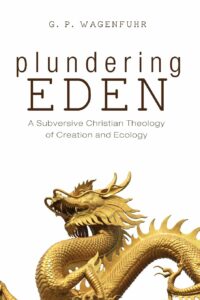 Plundering Eden: A Subversive Christian Theology of Creation and Ecology G.P. Wagenfuhr (Cascade Books) $27.00 OUR SALE PRICE = $21.60
Plundering Eden: A Subversive Christian Theology of Creation and Ecology G.P. Wagenfuhr (Cascade Books) $27.00 OUR SALE PRICE = $21.60
You know that stack of (ever growing) books I said I have that I want to get to? You know that stack, too, eh? This, too, is on it. I have to admit — unlike the one above that I really “get” and can’t wait to read — I am not sure what is going on in this one. It seems really important, maybe a bit different, but some folks I respect have endorsed it. It seems to be a follow-up or companion to his previous Plundering Egypt: A Subversive Christian Ethic of Economy that came out a few years ago. That was one heck of a book, written by a leader in the ECO Presbyterian denomination.
I’m not stalling here, but providing some context: here are two quotes about that previous one, Plundering Egypt. You’ll know if that, or this new one, is for you by checking this out:
In a world where the economy pervades every cultural domain, money dominates our imagination, and consumption defines our identity, we need increasing clarity about all things economic. Gregory gifts us in Plungering Egypt with a prophetic perspective that will helps us discern the spiritual dangers inherent in the system. — Alan Hirsch, missional activist and author
One part the intellectual-historical narration of MacIntyre, one part the ideological criticism of Žižek, and another part the theological exegesis of Bonhoeffer, Gregory Wagenfuhr’s study offers a compelling account of the ways in which the logic of monetary economics has dominated and continues to shape human relationships. The tonic he proposes is a rediscovery of the radically subversive form of Christian existence prescribed in the New Testament–one in which reconciliation, rather than exchange, sets us free. For anyone despairing the domesticated gospel of Christendom, this Plundering Egypt book will be a cup of cold water in the desert. An exciting read!–Justin Stratis, Tutor in Christian Doctrine, Director of Postgraduate Research, Trinity College Bristol
Which brings us to Plundering Eden: A Subversive Christian Theology of Creation and Ecology. Here is what it says on the back cover which I’ve read several times and it remains fascinating:
“Christian ecotheology runs the risk of making God himself a resource for human exploitation as a means to species survival. The world of climate change, soil depletion, and mass species extinction reveals a frightening conclusion — humans act as cosmic parasites. The problem is not with the world — talk of climate change blames the symptoms displayed by the victim — but with human epistemology. Humans are systematically incapable of rightly perceiving reality, and so must socially construct reality. The end of this epistemological problem is necessary ecological devastation by the development of civilization. In Plundering Eden, Wagenfuhr traces ecological problems to their root cause in the broken imagination, and argues that reconciliation with God the Creator through Jesus Christ is the only means to ecological healing through a renewed, kenotic imagination expressed in the creation of an alternate environment that reveals the kingdom of God–the ekklesia.”
Maybe these enticing summaries and endorsements will help:
No one likes to be accused of being a parasite with delusions of grandeur, but this is the opening note sounded in the prophetic trumpet blast that is Plundering Eden. Like Nietzsche’s madman, Wagenfuhr rushes into our global village announcing the death not of God but civilization, that doomed project of thinking humanity could by building things wrest order from chaos. The Babel-onian captivity from which Wagenfuhr seeks to free us consists of a wrong way of imagining the world, namely, as something to be mastered, often through violence, with devastating effects on nature and society alike. The solution lies in giving up the juvenile fiction that we are masters of our own fate and submitting our imaginations to the logic of creation and new creation, that is, to the vision of the world created and recreated in, through, and for Jesus Christ. –Kevin J. Vanhoozer, Trinity Evangelical Divinity School
Civilization is an idolatrous myth that is literally killing us. For Christians, argues Greg Wagenfuhr, the only plausible antidote to our predicament is the redemption of our imagination of ourselves as creatures. A timely and robustly theological intervention in ecological ethics. –Brian Brock, University of Aberdeen
Few can dispute Greg Wagenfuhr’s description of how humanity has been (wittingly or not) a parasite, plundering, destroying, and sucking the life out of the planet (Eden, creation). His analyses of how our ways of thinking (our myths and imaginaries–especially the uncontested rule of technique/technology and scientific management) are the culprit behind the plunder are spot on. Wagenfuhr’s bold revisionist theology of creation and redemption and his calls for radical, costly change on the part of Christians must be taken with total seriousness. . . Plundering Eden has a very important and urgent message for our times.–David W. Gill, Gordon-Conwell Theological Seminary
Still not sure if Plundering Eden is worth your time to read? Or whether you will mostly agree or not? Here is a fabulous rejoinder article he wrote to reply to friendly critics at a Symposium about the book. (The Symposium was sponsored by the Carl Henry Center at Trinity Evangelical Divinity School.) It’s one long piece, but there are hyperlinks linking back to each of the scholars who presented affirmations and criticisms. (One of the respondents to Wagenfuhr was Brian Brock, who above has a blurb, and one very interesting response is by J. Richard Middleton offering some interpretive missteps Wagenfuhr. Richard, you may know wrote the must-read A New Heaven and a New Earth: Reclaiming Biblical Eschatology. Enjoy this conversation and then come back and order some books!
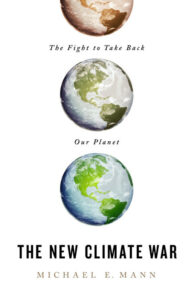 The New Climate War: The Fight to Take Back Our Planet Michael Mann (Public Affairs) $29.00 OUR SALE PRICE = $23.20
The New Climate War: The Fight to Take Back Our Planet Michael Mann (Public Affairs) $29.00 OUR SALE PRICE = $23.20
If you have been following the debates about climate science and the often bizarre deflection and misinformation by those who oppose the large scientific consensus about the dangers you probably know the name of Michael Mann, the distinguished professor of atmospheric science at Penn State and the (in)famous hockey stick chart. The opposition to Mann has been ferocious (he gets death threats!) The resistance to those working for better care of our planet is often extreme — from the debunked Frederick Seitz and his “Oregon Petition” which is supposed to prove there isn’t a general consensus among scientists (signed by “scientists” with names like Geri Halliwell of the Spice Girls and the beloved MASH character B.J. Hunicutt) to Trump’s anti- environmentalism EPA guy Scott Pruitt and the notorious Koch brothers funding a Michael Moore movie, etc. etc. The first few chapters of this clear-talking book explains the recent “climate wars” and public debates and without mincing words, shares his perspective and rebuttals to his critics. Just the first few chapters that shows who is who in this contentious matter are worth the price of the book. And, interestingly, although he has much to be mad about, the tone is almost hopeful.
Here is one review from the New Scientist that indeed calls it “hopeful.” Skip the silly Amazon link in there and come on back, please.)
Most of this book, in fact, is taking the reader behind the “information wars” and some of the backstories of those who have scars from the climate battles. From Bill McKibben being tailed to public accusations of hypocrisy and shaming for using airplanes to the more complicated and substantive dynamics about political polices, The New Climate Wars helps us sort out what is going on when those with much vested interest — fossil fuel companies, polluters, profiteers, and market ideologues — fight back against those trying to steward the planet well.
Sure there is good ground for people of good faith to disagree about the wisest policies, but this isn’t Mann insisting he or his colleagues (or the UNFCCC) is perfect but that the climate change deniers are themselves not fighting fair. (And, as he explains, have even been in cahoots with Russian meddlers and bots who have messed with our election processes. They of course, want to further monetize their own primary economic asset — oil reserves so, frankly, supported the election of a President who promised to turn back environmental regulations and brazenly open up even crummy oil fields (Tar Sans) and in wilderness areas. Trump’s own “Russia-gate,” Mann suggests, was clearly connected to fossil fuels.
Mann’s exploration of who started the campaigns about how wind power kills birds is fascinating. No, it was not the Audubon Society (who, he notes, actually has the mission to care for our feathered friends) but Robert Bryce of the Koch-funded Manhattan Institute who funneled inaccurate pieces to The Wall Street Journal, National Review, Fox Business shows, and even got President Trump writing about it. Remember when a supposedly reputable source said that wind turbines cause “UFO crashes” and Trump said they “cause cancer”? This book would be laughably entertaining if it weren’t so awful.
But. here is another important concern and I have not read enough to say. Mann is what some have called a “techno-optimist.” While he knows that climate change and rising sea levels are huge, structural problems he seems to only focus on market-related answers. He scoffs at “reforestation” and more regenerative kinds of agriculture. He’s an engineer and while not politically conservative, still working within the standard capitalist assumptions. He is no Wendell Berry or Steve Bouma-Prediger if you get my gist. (I’ve been enjoying Bill Gates new book, too, How to Avoid a Climate Disaster, although it is above my head with his call for big investments in clean energy technologies. He is urgent and realistic and explains lots of science about energy stuff in great detail.) Mann, some have said, seems not only to be understandably frustrated at the deniers but he even turns on those who might be considered by a more generous leader, an ally.
The New Climate War is about the public debates and it behooves us to understand some of this. Throughout he shows facts about the consensus among most scientists, argues for certain sorts of policies that, agree or not, are well worth considering even if he may not see the full big picture of the sorts of reforms we may need. Right-wing mocking of tree huggers and disinformation simply doesn’t help. Mann is a bit sarcastic here, too, so read it knowing of his big bias. I happen to think he is mostly right.
As Bill Nye the Science Guy puts it “Read this book, and let’s get to work.”
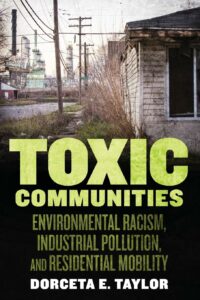 Toxic Communities: Environmental Racism, Industrial Pollution, and Residential Mobility Dorceta E. Taylor (New York University Press) $29.00 OUR SALE PRICE = $23.30
Toxic Communities: Environmental Racism, Industrial Pollution, and Residential Mobility Dorceta E. Taylor (New York University Press) $29.00 OUR SALE PRICE = $23.30
I do not have space to say much about this 2014 powerhouse of a book studying the complex reality of environmental racism, but will merely say much that this book is considered by many to be one of the very best books on the subject. From St. Louis to New Orleans, from Baltimore to Oklahoma City, “there are poor and minority neighborhoods so beset by pollution that just living in them can be hazardous to one’s health.” Much of this is injustice faced by some of our fellow citizens stems from long-standing patters of segregation and racism in zoning, real estate and banking (see classics like the must-read The Color of Law: A Forgotten History of How Our Government Segregated America by Richard Rothstein, Not in My Neighborhood: How Bigotry Shaped a Great American City by Antero Pietila [about Baltimore] or Redlined: A Memoir of Race, Change, and Fractured Community in 1960s Chicago.) And it is caused by “the path of least resistance” as toxic dumpers and unscrupulous businesses could get away with polluting poor and minority communities, targeting them in ways they simply couldn’t in more middle class and well resourced neighborhoods.
As it says on the back, Toxic Communities “takes stock of the recent environmental justice scholarship” and offers some new insights and concepts for understanding environmental racism in contemporary United States.
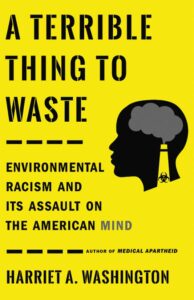 A Terrible Thing to Waste: Environmental Racism and Its Assault on the American Mind Harriet Washington (Little Brown, Spark) $17.99 OUR SALE PRICE = $14.39
A Terrible Thing to Waste: Environmental Racism and Its Assault on the American Mind Harriet Washington (Little Brown, Spark) $17.99 OUR SALE PRICE = $14.39
Most BookNotes readers may not be old enough to remember the popular ad slogan for the United Negro College Fund, “A mind is a terrible thing to waste.” This cleverly plays on that phrase even showing that environmental racism “assaults the American mind.” Fascinating.
Harriet A. Washington has a Fellow at the University of Nevada’s Black Mountain Institute, a Research Fellow in Medical Ethics at Harvard Medical School, a senior research scholar at the National Center for Bioethics at Tuskegee University, and a visiting scholar at DePaul University College of Law. She has held fellowships at the Harvard School of Public Health and Stanford University. Not too shoddy, eh? She hasn’t wasted her mind! Dr. Washington is also the author of Deadly Monopolies, Infectious Madness, and Medical Apartheid, which won a National Book Critics Circle Award, the PEN/Oakland Award, and the American Library Association Black Caucus Nonfiction Award. This new edition of A Terrible Thing to Waste came out in paperback about a year ago and has been widely reviewed and praised’ Gerald Markowitz (who has written powerfully on the toxic lead poisoning) has called it “powerful and indispensable.”
The theme of this book is not just that poorer communities of color are dumping grounds toxic waste and are more polluted (located, as they often are, near harsh industrial plants) but that this has caused cognitive decline in poor children. The great inner city educator Jonathan Kozel said that years ago and here is an expose that draws on science research and documentation, offered with lively, if heartbreaking, reporting.
A Terrible Thing To Waste does look at the devasting consequences of environmental racism but promises to show “what we can do to remedy its toxic effects on marginalized communities.” I was glad to see in the paperback edition there was a new preface even addressing Covid-19.
She writes lucidly of how pollutants such as heavy metals and neurotoxins injure developing brains and recounts vividly case after case of the devastating cost to human brains and bodies. As she demolishes racist notions of inherited intelligence, she describes the medical consequences of horrific environmental catastrophes that have largely been forgotten or overlooked. Revelatory and compelling, Harriet Washington’s A Terrible Thing to Waste is the Silent Spring for the 21st century. ―Robin Lindley, JD, Features Editor, History News Network
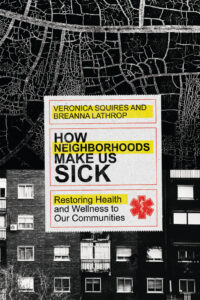 How Neighborhoods Make Us Sick: Restoring Health and Wellness to Our Communities Veronica Squires & Breanna Lathrop (IVP) $20.00 OUR SALE PRICE = $16.00
How Neighborhoods Make Us Sick: Restoring Health and Wellness to Our Communities Veronica Squires & Breanna Lathrop (IVP) $20.00 OUR SALE PRICE = $16.00
In light of the above titles, I thought I would reprieve this review I wrote a few years ago when this great book released. Do you know anybody who would care about this?
Of course toxic buildings and environmental dangers are not exclusively the plight of those living in parts of cities populated by people of color, but there is a thing called environmental racism, and it is undeniable that those in poorer neighborhoods, often people of color, are plagued with bad water and industrial pollution and lead paint and asbestos and the like in levels much worse than wealthier and mostly whiter parts of town. As Squires and Lathrop bravely discuss, even the psychological conditions of living with racial trauma has significant documented health repercussions. (I’m writing this just days after a police officer in Pittsburgh was exonerated for shooting a boy in the back as he was running away; a good friend of mine, a black pastor in ‘the burgh, wrote that he hardly feels safe in his own town.) These troubles — physical, sociological, psychological — impact the health of those living in disadvantaged neighborhoods.
We have long wished for a readable, affordable book about public health from a Christian perspective. And, we have long wished for a book about the poverty experienced by the urban underclass which includes more about substandard housing and the health problems associated with leaky pipes which cause mildew, sewage problems, asbestos, and the like.
How Neighborhoods Make Us Sick is a godsend and we congratulate IVP for being the first publisher to make this contribution to our understanding of how sin and the subsequent social dysfunction have badly effected our built environment and how social injustice literally has public health implications.
The book is nicely designed, handsome, interesting, well-informed, passionate without being polemical, and a helpful look at the stark realities of public health in old and often poor and often urban settings.
Kudos and many thanks to these authors. Here are their bios for those who might want to know solid credentials and be pleased to learn of their deep experience:
Veronica Squires is chief administrative officer for Good Samaritan Health Center in Atlanta. She previously served as director of corporate development for Boys and Girls Clubs of Metro Atlanta and as the Georgia director of ministry partnerships for InterVarsity Christian Fellowship. She is a certified CCDA practitioner and serves on the advisory board for the Georgia Charitable Care Network.
Breanna Lathrop is chief operating officer and a family nurse practitioner for Good Samaritan Health Center. She earned her Doctor of Nursing Practice from Georgia Southern University and a Master’s of Public Health and a Master’s in Nursing from Emory University. She is passionate about eliminating health disparities through improving health care access and health outcomes among vulnerable populations, and has previously published on the social determinants of health.
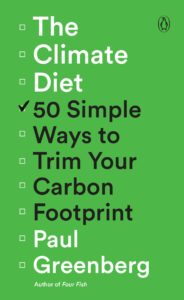 The Climate Diet: 50 Simple Ways to Trim Your Carbon Footprint Paul Greenberg (Penguin) $13.00 OUR SALE PRICE = $10.40
The Climate Diet: 50 Simple Ways to Trim Your Carbon Footprint Paul Greenberg (Penguin) $13.00 OUR SALE PRICE = $10.40
This is brand, brand new, a mass-market sized small book that is for those who need practicality. Or at least concrete ideas. And, wow, are they fascinating. The title is a bit misleading as it isn’t only about our diet (although the author is perhaps most well-known for his eco-culinary book Four Fish and there are some great cooking suggestions here.) The use of “diet” here, though, is more the other usage — as in going on a diet. We need to go on a carbon diet, lose some of that extra waste. He gives you lots of consider.
For what it is worth, there are lots of great ideas for a more faithful, simple lifestyle and tips about home cleaning products and going green you can get for free with the click to the internet. We have books like Go Green, Save Green: A Simple Guide to Saving Time, Money and God’s Green Earth by Nancy Sleeth. But this guy really explores some remarkable stuff and although his suggestions are only briefly described, it’s more interesting than most of these sorts. Also, the great appendix in the back has very up-to-date websites and contact info for learning about everything from “smart” thermostats for your home to wiser ways to compost; he has info about tree-planting arbor organizations and a cool bike-share website. Fantastic.
+++
Okay friends. We’ve given you a lot to consider, big books, small books, Biblical studies and science titles. Some of our suggested authors are conservative theologically, others less so. Many are in the mainline denominational churches but some are in more independent and evangelical congregations. Some are not Christian at all. Not all agree with each other on every aspect of faith and science or a Christian view of creation care, let alone the science and ethics of climate change. But all are very good reads, important, urgent, even. Please consider which you might buy, which you might donate, which you might encourage your group to read together.
And since I’m on a roll, allow me to name five other books that are not primarily about environmental stewardship or creation care or ecological ethics as such. But, I’m telling ya, they are well worth reading in these complicated days as we hear God’s creation groaning…
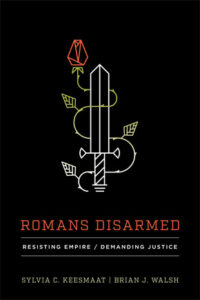 Romans Disarmed: Resisting Empire / Demanding Justice Brian Walsh & Sylvia Keesmaat (Brazos Press) $29.00 OUR SALE PRICE = $23.20
Romans Disarmed: Resisting Empire / Demanding Justice Brian Walsh & Sylvia Keesmaat (Brazos Press) $29.00 OUR SALE PRICE = $23.20
I’ve reviewed this at length before at BookNotes and it is one of the most remarkable books I’ve ever read, even more jaw-dropping, confounding, convicting, entertaining, enriching, and controversial than their extraordinary Colossians Remixed: Subverting the Empire. It shows how the early church gathered in inclusive, caring communities and developed a way of life that claimed God’s grace as the ultimate reality, naming Christ as the true King, and how the book of Romans is less an epistle of systematic theology but a manifesto of how to live in the Spirit in the face of the totalizing brutality of the Roman Empire. It makes a very compelling case about how to live when the world is falling down around you and how to take inspiration from the Old Testament echoes woven throughout the New Testament letters. The chapters on the groaning creation (Romans 8) tells you much of what you need to know about the ecological crisis of the twenty-first century and how the Bible can shape our lives as faithful home-makers.
Brian and Sylvia are creative and dear folks. They have great empathy for those who are sad or hurting and they know a thing or two about advocating for policies of public justice. They read Romans “from the margins, as it were, but also from the land. Despite being authors and academics and activists, they are farmers. They sell crops and chickens and host events at their Russet House regenerative farm about the Bible and biodiversity, about permaculture and watershed discipleship and the like. What a commentary this is, infused with great hope for the good creation.
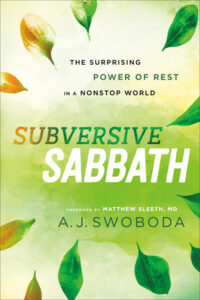 Subversive Sabbath: The Surprising Power of Rest in a Nonstop World A. J. Swoboda (Brazos Press) $19.99 OUR SALE PRICE = $15.99
Subversive Sabbath: The Surprising Power of Rest in a Nonstop World A. J. Swoboda (Brazos Press) $19.99 OUR SALE PRICE = $15.99
I mentioned A.J. Swoboda (above) as the co-author of an excellent, sophisticated study of evangelical ecotheology. This one is deeply connected to that, I think, as he here invites us to subvert the very go-go-go and buy-buy-buy visions of growth and progress that have driven the Western world to disregard creational limits and exploit the creation and our very selves. Agree with the above titles about earth-keeping and climate change, nobody denies that we need rest. Few deny that the Old Testament call to sabbath and sabbath-keeping have pertinent wisdom for our modern predicament.
I think at a BookNotes review before I said that this was the best book on sabbath we’ve read. And there are so many good ones. Matthew Sleeth (whose own 24/6 I mentioned in passing above) wrote the foreword to this one. Norman Wirzba’s Living the Sabbath: Discovering the Rhythms of Rest and Delight which is perhaps the most comprehensive offering a “sabbath way of life” is duly cited. Subversive Sabbath yet is lively and captivating.
As John Mark Comer (whose own latest book is called The Ruthless Elimination of Hurry) said of it,
“Few things are as subversive to the hurry addiction of the modern world than the practice of Sabbath. And few things are as life-or-death important. A. J. has written his best book yet. His keen mind, quick wit, and deep soulfulness come through beautifully, page by captivating page. But more than anything, this is a book that is lived. My new go-to book on the Sabbath.”
 Ragan Sutterfield (Franciscan Media) $16.99 OUR SALE PRICE = $13.59
Ragan Sutterfield (Franciscan Media) $16.99 OUR SALE PRICE = $13.59
All rightee then. Some of you may have been waiting for this (or something like it.) To be honest, I’ve been working on and off on an entire BookNotes column on the many books (essays, novels, short stories, poetry) of Wendell Berry that I might post one of these days. I had the great joy of doing a Zoom adult Sunday school class for a Presbyterian church a month ago about Mr. Berry and that got me really wanting to do a reader’s guide to his many books. That might come later.
For now, if I were to suggest one book that allows us into the world of the Kentucky farmer and writer, it would be this. There are others, and, of course, you should read Berry’s own works. Ragan Sutterfield is an Episcopal priest and has had experience at small-town faming. (His short book Cultivating Reality: How the Soil Might Save Us is very strong and quite potent; he has a small study guide, too, called Church, Creation, and the Common Good: Guidance in an Age of Climate Crisis published by Church Publishing a few years ago.) His introduction to the wisdom and ways of Wendell Berry is brilliant. I can’t say enough about it.
I do hope you will buy a book on creation care and study how these authors, above, point us to an ecological worldview and a responsible lifestyle in God’s good but damaged world. But this — a dive into the water of Berry’s unique way of thinking/being — may be the most important thing yet to do. “It all turns on affection,” he says, in a book of essays with that title. We dare not be abstract or love “the world” without knowing our place, our land, the really real. The Kingdom of God reorients our desire and, in humility, we can become “native to this place.” Ragan lives this stuff and, doubtlessly, has explained it as well and as beautifully as
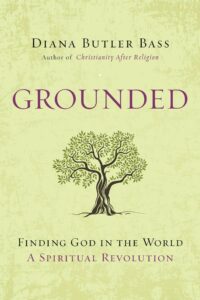 Grounded: Finding God in the World-A Spiritual Revolution Diana Butler Bass (HarperOne) $16.99 OUR SALE PRICE = $13.59
Grounded: Finding God in the World-A Spiritual Revolution Diana Butler Bass (HarperOne) $16.99 OUR SALE PRICE = $13.59
I have written about this book before and you may know I appreciate Diana and her many books. Her latest, Freeing Jesus has been a real blessing to many of my peers and even customers we hardly know have told us how they appreciated it. Her role as a scholar of the contemporary religious landscape and a practitioner of faith is wonderful to see.
This book came, a few years ago, on the heels of her deep research into congregational life, the health of churches that were forming community and offering genuine hospitality. As new folks entered mainline churches, they created some anxieties and renewal, too. She wrote a fascinating book about the “spiritual but not religious” types and how the church might more authentically relate to this new ethos. I’m not sure I liked it fully, but she remains a leader I recommend regularly. She really does understand why many are leaving institutional structures of faith, but are still seriously longing for some religious faith. She has been an advocate for these “spiritual but not religious” when many have been dismissive. She realizes that something needs to change in our churches and in the way they present the faith to others. And then she wrote this.
And my, my, I loved this writing, bringing to mind the likes of Barbara Brown Taylor’s An Altar in the World: A Geography of Faith and Learning to Walk in the Dark. It’s a bit more theological than Taylor although there is plenty of beautiful nature writing and memoirist self reflection and good, touching storytelling.
By looking at dirt, water, and sky as our natural habitat (and roots, home, and neighborhood as our human geography) she invites us to a real-world, earthy spirituality, a faith that invites us to find God amidst our daily humanness. She isn’t the only one to say this, nor is she the most detailed. But in all of this she reminds us of how corrupting a dualism between the physical and spiritual, the secular and the sacred, liturgy and life can be and how revolutionary it may seem to many church-goers to say that God is everywhere and there are sacred moments outside the walls of the church building.
Yep, if we are going to nurture a sustainable faith that lasts in these secularizing times we need a robust creational theology, a faith that is more than only about heaven and the afterlife. We need a vision of Kingdom coming in Biblical words and truths like shalom and incarnation and reconciliation. Butler Bass doesn’t fill that out entirely but in this lovely book she starts us thinking in the right direction, inviting us in to finding God in the ordinary. Again, she writes about dirt, water, sky; roots, home, neighborhood. And the commons.
Grounded is a wise and beautiful book. It is, in fact and in places, almost an anthem to the sacred unity of the physical and the spiritual in the formation of human faith and in the maturation of the human soul.– Phyllis Tickle, author of The Great Emergence
In Grounded, Diana Butler Bass brings theology back down to earth. She writes about the environment and about the church in a way that makes sense, feels authentic, and doesn’t put you to sleep. A stunning book that will open up new conversations in the church and beyond.– Shane Claiborne, author of The Irresistible Revolution
I absolutely love this book. I’ve long respected Diana Butler Bass for her intelligent, academic approach to the religious conversation, and never more so than in the pages of this book. Grounded made me love this beautiful world more deeply, and made God’s presence more visible everywhere I looked.– Shauna Niequist, author of Savor and Bread & Wine
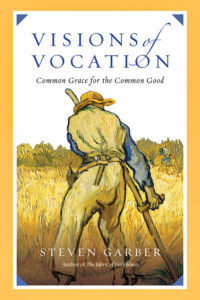 Visions of Vocation: Common Grace for the Common Good Steven Garber (IVP) $18.00 OUR SALE PRICE = $14.40
Visions of Vocation: Common Grace for the Common Good Steven Garber (IVP) $18.00 OUR SALE PRICE = $14.40
I have often said that this is one of my all-time favorite all books. Certainly Steve is one of my all time favorite people. I was deeply challenged and informed in lasting ways by his first major volume, The Fabric of Faithfulness: Weaving Together Belief and Behavior and I have raved about his collection of short essays in The Seamless Life: A Tapestry of Love and Learning, Worship and Work. But this; this one I find myself showing off and quoting from and telling about almost anytime I am giving a talk or class on hard things. Things like coping with climate change, nurturing a Christian imagination in the arts, being faithful at work amidst hard workplaces, resisting bad ideologies in the public square, fighting world hunger, being an anti-racist agent of reconciliation, and, well, nearly any aspect of living out the implications of the Christian life. Steve has been an encouragement to people doing often nearly heroic things in places big and small, in the global south and in under-served inner cities and in big urban corporations and in rural settings, ranches and farms that he loves.
Steve was shaped by important theological voices from old Puritans to older mystics, from moderns like Francis Schaeffer and John Stott. He has read Newbigin and Wright and Simone Weil. In a message at the recent funeral of his dear friend David Naugle he played and quoted from Davey’s favorite band, Switchfoot. I say this just so you know that he is intersting and attentive and the pages of.Visions of Vocation will easily go from ruminating on a Bible passage to talking about a visit to Wendell Berry, to citing a contemporary pop song (or a classic novel.)
I have said plenty about Visions of Vocation before but I close this list with it now for two reasons.
Throughout the book, Steve is grappling deeply with and for those who feel the weight of our times about our complicity in the world’s brokenness. Many of us are exhausted these days, many of us weep openly, many of us are hardly able to sing our favorite hymns — not so much because of doubt but because of understandable cynicism or just because of the sorrows of these times. Steve reminds us without being glib or shallow or cliched, that God, too, loves this world through His tears, that God is faithful to the redemptive project not in spite of the world’s sins but because of them. We, too, in God’s image and transformed by His grace can do this, adding our failures and foibles to His work, a small gift of grace for the common good. In our weakness we lean in to Christ’s presence. We can endure. I think this is one of the most helpful books for thoughtful long-haul disciples these days for this reason. He so nicely combines “heart and mind” that our fans and friends will want to read him. He reminds us of our vocation, cruciform as it may be. If you are overwhelmed by all this climate change stuff and the vocation of stewardship (and whether we are even allowed to call it that now — ha!) Garber’s reminder that it okay to feel the feels and carry on, will be a thoughful balm and a steady motivation.
Secondly, there is a particular chapter in Visions of Vocation that is worth pondering in this context. It is about what he calls “proximate justice” which is to say (in my stumbling way) that we can’t always get what we want. Short of God’s own healing when Christ returns, we will not see Kingdom Come. The creation, which includes us, is groaning and will continue to groan. We can do what we can, where we can, and it will never be enough. Can we learn to be content in the hope of God saying “well done” even if we didn’t do all we might wish or accomplish what we hope? Can you live with the proximate? Fancy pants theologians and Christian philosophers warn us not to “immanentize the eschaton” which is to say, trying to build heaven on earth. That leads to ideology and pride and probably violence of some sort or another. It is a temptation of social reformers and political activists of the left and right. Garber gives us a wise way to think about coping with not getting all we wish for in this needy world, even as we press on with our eyes on the prize.
We need not live for our successes but hopefully we can see some sort of health and wholeness and social reform; Visions of Vocation: Common Grace for the Common Good helps us hang in there, glad for what God gives us to do day by day. If you have read this far in this weighty list, I certainly commend it to you. Thanks for caring.
+++
It is very helpful if you would tell us how you prefer us to ship your orders. The weight and destination of your package varies but you can use this as a thumbnail, general guide.
There are generally two kinds of US Mail options, and, of course, UPS. If necessary, we can do overnight and other expedited methods, too. Let us know what you prefer.
- United States Postal Service has the option called “Media Mail” which is cheapest but slow and may be delayed. For one book, usually, it’s about $3.20.
- United States Postal Service has another option called “Priority Mail” which is about $7.00 or so for a few books and that gets much more attention than does “Media Mail.”
- UPS Ground is more reliable but about $8.00 or more for one or two books to most places.
DON’T FORGET TO LET US KNOW WHAT SHIPPING METHOD YOU PREFER.
BookNotes
SPECIAL
DISCOUNT20% OFF
ALL BOOKS MENTIONED
+++
order here
this takes you to the secure Hearts & Minds order form page
just tell us what you want to orderinquire here
if you have questions or need more information
just ask us what you want to knowHearts & Minds 234 East Main Street Dallastown PA 17313
read@heartsandmindsbooks.com
717-246-3333
We are still closed for in-store browsing due to our commitment to public health and the common good (not to mention the safety of our staff and customers.) The vaccination rate here in York County is sadly lower than average. We are doing fun, outdoor, backyard customer service, our famous curb-side delivery, and can show any number of items to you if you call us from our back parking lot. We are eager to serve and grateful for your patience as we all work to mitigate the ongoing pandemic.
Of course, we’re happy to ship books anywhere. Just tell us how you want them sent.
We are here 10:00 – 6:00 Monday – Saturday; closed on Sunday. Thanks for your support.

